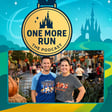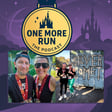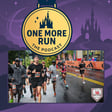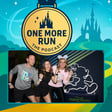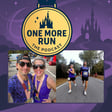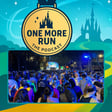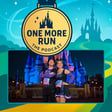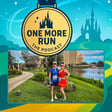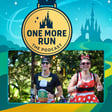Become a Creator today!Start creating today - Share your story with the world!
Start for free
00:00:00
00:00:01

Ep 6 - Strength training is so so so important (with special guest, Shawn Daniel)
In this episode, we’re joined by special guest Dr. Shawn from The Mobile Athlete to talk all things strength training for runners. Whether you're chasing your first runDisney medal or chasing a new PR, strength, mobility, nutrition, hydration and recovery are key to running strong and staying injury-free. We dig into the most important exercises, common mistakes runners make (including our own), and how building strength can completely change your running experience. If you’ve been avoiding the gym or aren’t sure where to start, we made this episode just for you.
Learn more about The Mobile Athlete at: https://themobileathlete.net and check out their helpful reels on Instagram http://www.instagram.com/themobileathlete.pt
Transcript
Introduction & Podcast Goals
00:00:00
Speaker
If you want to be a good, fast, and consistent runner, it takes way more than just running.
00:00:05
Speaker
Today we're talking about all those other things you should be doing when you're not running.
00:00:19
Speaker
Hey, everybody.
00:00:19
Speaker
Welcome to episode six of the podcast, Erica.
00:00:22
Speaker
It is blowing my mind that we are on episode six already.
00:00:25
Speaker
Yes.
00:00:25
Speaker
How do you feel about making it this far?
00:00:27
Speaker
Having so much fun.
00:00:28
Speaker
I know.
00:00:28
Speaker
This is a fun, silly little thing, but it's actually not silly in our purpose, right?
00:00:34
Speaker
We kind of have fun doing it.
00:00:35
Speaker
It's been a ton of fun.
00:00:36
Speaker
We keep the bloopers, all of that.
00:00:38
Speaker
Yes, we do.
00:00:39
Speaker
But it's really actually kind of deep rooted in our desire to help new runners.
00:00:45
Speaker
right like if you're new to running or especially if you're signed up for a run disney race we really want this to be a resource for you and we're going to talk lots of logistics and lots of tips and tricks as you like to say uh lots of tips on how to get to the start line and the finish line at a run disney race right before we dive into the topic though we got a review yes and that just i mean means a lot right we we officially now have three
00:01:09
Speaker
We do, yes.
00:01:10
Speaker
And that, I can't even tell you.
00:01:11
Speaker
It's on Apple Podcasts.
00:01:12
Speaker
Would you be willing to read the review?
00:01:15
Speaker
Yes.
00:01:15
Speaker
Okay.
00:01:16
Speaker
Who's this review from?
00:01:18
Speaker
This review is from someone called Not Running Soon.
00:01:23
Speaker
Let's see what they have to say.
00:01:26
Speaker
AJ and Erica, thank you so much for starting this podcast.
00:01:29
Speaker
I used to run many
Meet Dr. Sean: Physical Therapy Insights
00:01:30
Speaker
years ago and got away from it.
00:01:31
Speaker
Although I'm still not convinced to sign up for a Run Disney event, the tips and tricks you talk about have helped me realize some old habits that possibly caused me to stop running in the first place.
00:01:41
Speaker
By the end of this series, I might actually take up running again, keep up the great work, and keep inspiring others.
00:01:48
Speaker
I love that.
00:01:50
Speaker
So today, Erica, a very important topic.
00:01:53
Speaker
What are we talking about?
00:01:54
Speaker
Yes.
00:01:54
Speaker
So today we have my good friend, Dr. Sean from the mobile athlete with us.
00:02:00
Speaker
These guys are physical therapists who not only focus on rehab, but also just moving forward, how to keep you strong and injury free.
00:02:08
Speaker
They've gotten you to basically get over a lot of the pain and stuff that you've been kind of chasing down and trying to fix for years.
00:02:16
Speaker
Yes.
00:02:17
Speaker
And now that Dr. Sean and his team's involved and coaching you, you feel like you're getting somewhere.
00:02:22
Speaker
Yeah.
00:02:22
Speaker
So, so much better.
00:02:23
Speaker
So much better.
00:02:24
Speaker
Why are we talking strength so early in our kind of like lineup of podcasts?
00:02:28
Speaker
We're counting down to Walt Disney World Marathon weekend.
00:02:31
Speaker
We've got 29 episodes, you know, on the way.
00:02:33
Speaker
But at episode six already, we're talking about strength.
00:02:36
Speaker
Before we bring Dr. Sean in, why are you, why did you think it was so important we hit this right now?
00:02:41
Speaker
Yeah, because really strength should be the foundation of what we're doing.
00:02:46
Speaker
I did not go that route when I started Run Disney and I had a lot of sort of ongoing nagging injuries, which I could have avoided if I had just started with strength.
00:02:57
Speaker
And we just didn't know that.
00:02:58
Speaker
That is correct.
00:02:59
Speaker
Which is why we're saying it now.
00:03:00
Speaker
That's why we're doing this podcast so that you don't make the same mistake.
00:03:03
Speaker
You're new to running.
00:03:05
Speaker
Let's just say you need to do your strength.
00:03:08
Speaker
That's correct.
00:03:08
Speaker
It's important.
00:03:09
Speaker
Yes.
00:03:09
Speaker
All right, let's dive right into this interview with Dr. Sean from The Mobile Athlete.
00:03:16
Speaker
Sean, welcome to the podcast.
00:03:18
Speaker
We're so excited to have you.
00:03:20
Speaker
Can you give me a smidge on
Training Tips: Cross-Training vs. Strength Training
00:03:21
Speaker
your background and who The Mobile Athlete is?
00:03:22
Speaker
I know you were a college athlete, played basketball.
00:03:24
Speaker
That's close to my heart because that's my favorite sport.
00:03:29
Speaker
Give me the brief synopsis of kind of who you are and what you guys are doing over at The Mobile Athlete, and then we'll dive into some of these questions we've got for you.
00:03:35
Speaker
Yeah, so at Mobile Athlete, we help motivated movers rediscover their prime.
00:03:40
Speaker
We work with, like our philosophy is if you have a body, you're an athlete.
00:03:45
Speaker
So that means if you're a professional athlete or if you're a little kid and everybody in between, we help them rediscover their prime and reach peak performance.
00:03:53
Speaker
And, you know, we're really more movement forward as providers.
00:03:58
Speaker
So here what we do is we really want to make sure that you're moving well and doing it for a lifetime.
00:04:04
Speaker
And you guys, like we said, you've already done that for Erica.
00:04:06
Speaker
So like you are, we're already big fans.
00:04:08
Speaker
We already found that to what you guys are doing over at the mobile athlete.
00:04:11
Speaker
We love it.
00:04:11
Speaker
And so we brought you in to talk through some stuff.
00:04:13
Speaker
We're going to rapid fire some just strength training questions towards you.
00:04:16
Speaker
You cool with that?
00:04:18
Speaker
cool with that.
00:04:19
Speaker
Okay.
00:04:19
Speaker
Here's, here's a basic one.
00:04:21
Speaker
What is the word, the phrase cross training, right?
00:04:24
Speaker
I hear that a lot.
00:04:24
Speaker
So they, I hear you're supposed to cross trains.
00:04:27
Speaker
Can you give us, you know, for the new runner, the weekend warrior, the person who's going to run their first 5k or maybe their first half marathon, they hear you're supposed to cross train, but I also hear things like, you know, strength training or mobility.
00:04:40
Speaker
Like I hear all these words.
00:04:41
Speaker
What, how would you, how do you define that?
00:04:43
Speaker
Is it, is it all the same thing?
00:04:44
Speaker
Is it different?
00:04:44
Speaker
How would you define cross training?
00:04:46
Speaker
Well, I think cross training by definition is really like the ability to train in different types of like endurance or strength events.
00:04:54
Speaker
Meaning like if I'm a runner in order to cross train to build my aerobic capacity and my lung capacity, I should probably do something that else is an endurance event like cycling.
00:05:05
Speaker
or rowing or swimming, something that's going to get my heart rate up, get my respiratory rate up, just how fast am I breathing?
00:05:13
Speaker
And in a steady state where I can maintain that for a long time, that's more of like the cross training, how I would probably more so define that as opposed to just strength training.
00:05:24
Speaker
So they're not the same thing.
00:05:26
Speaker
Not the same thing.
00:05:27
Speaker
Okay.
00:05:27
Speaker
So how then do you define strength for people to, you know, if they, they heard they're supposed to cross train and when you kind of define that, which is perfect, what is strength then?
00:05:35
Speaker
Strength is, if you want to think like you see someone who has little muscles and someone who has big muscles, right?
00:05:39
Speaker
Which one do you think is stronger?
00:05:41
Speaker
You know, like you want to do things that are going to improve strength.
00:05:44
Speaker
And so that's going to be, if we get really nervy on this, we're talking like, if I'm going to strength train where I lift dumbbells and barbells, I want to be able to do that.
00:05:53
Speaker
really quickly with a few reps as hard as I can.
00:05:57
Speaker
So that by the end of those like three to five reps, I am like, I'm, I'm like, I'm zonked, right?
00:06:02
Speaker
Like I have to take a break.
00:06:04
Speaker
So in order to build strength, there's other ways that you can do that.
00:06:07
Speaker
Like we think about strength or power, which I'm sorry, I'm getting around another track, right?
00:06:12
Speaker
But we're going to start strength training, like with lifting different than we would like cycling or swimming as we just kind of defined with cross training.
00:06:20
Speaker
So if I'm new to this whole thing, right, and we, our audience is primarily, or our friends are primarily runners, right?
00:06:26
Speaker
Like what are the, how would you define strength training for runners?
00:06:28
Speaker
Like, what would you say?
00:06:29
Speaker
You know, these types of exercises, well, I do want to ask, like, what are good ones for us to do?
00:06:33
Speaker
What ones should we not do?
00:06:34
Speaker
Like, I want to get into that, but generally speaking, are we talking pushups and pull-ups and things like that?
00:06:38
Speaker
Are we talking kettlebell swings?
00:06:40
Speaker
What are we talking about for runners?
00:06:41
Speaker
Yeah.
00:06:42
Speaker
You know, I think the fitness industry does a really good job of overcomplicating these things.
00:06:47
Speaker
You know, if we just, if we could just move practically and functionally, like our whole slogan is you want to move, we want you to move better for longer.
00:06:55
Speaker
And if you can do the basics, like a squat or a lunge or a pushup or a plank, you
00:07:02
Speaker
Those sort of things, if you can do that well, man, you're doing better than half the population because most of them don't even do that.
00:07:10
Speaker
But this is a running podcast.
00:07:11
Speaker
Most of the runners that I talk to, they don't straight train or they don't really do much straight training in general.
00:07:17
Speaker
Right.
00:07:17
Speaker
I think we overcomplicate it.
00:07:19
Speaker
We really try to say, well, how many supersets are you doing of this X, Y and Z?
00:07:23
Speaker
And are you are you doing buys and tries a day or doing chest and back?
00:07:27
Speaker
What are you doing?
00:07:27
Speaker
You know?
00:07:29
Speaker
You can do isolated strength training where you're targeting just your biceps.
00:07:33
Speaker
But if we're talking about just people who want to move well and want to feel good, but they want to run, just being able to do functional movements or probably the term compound movement comes up from time to time where it's like I'm going to squat and it's going to involve more joints and muscles at one time.
00:07:51
Speaker
It's going to give me maybe a more efficient workout for what I'm trying to accomplish.
00:07:56
Speaker
And for some people, it's just, how can I do this more quickly?
00:07:58
Speaker
You know, how can I get this done faster so I can move to the thing I want to do, which is like running fast.
00:08:02
Speaker
Yeah.
00:08:02
Speaker
I'm guilty of not doing strength training for sure.
00:08:04
Speaker
I, I, I dislike it a lot.
00:08:06
Speaker
I understand the importance of it and that's one of the upcoming questions, but man, I dislike it.
00:08:10
Speaker
Okay.
00:08:10
Speaker
So what types of exercises are good for new runners or maybe like, um, brand new athletes for runners, new runners?
00:08:20
Speaker
Uh, I think the lunges are, are a great place to go.
00:08:24
Speaker
Squats are good.
00:08:25
Speaker
It's going to really target the quads and the hamstrings and the glutes.
00:08:28
Speaker
And, um,
00:08:30
Speaker
core work is often not addressed.
00:08:34
Speaker
I'll just say this.
00:08:35
Speaker
I define everything from like your chest to your knees as your core.
00:08:38
Speaker
So if you want to call that your midsection, but most people don't really train that area very well to be able to withstand force if they're like picking up something heavy or if they're trying to rotate with something.
00:08:51
Speaker
I often think about like picking up a heavy box in the garage and turning and putting it on the shelf.
00:08:55
Speaker
We have to be practical like that, but also this reciprocal motion of rhythmically moving your hands and rotating your torso as you're running an endurance event.
00:09:04
Speaker
You've got to be able to have strength in that area as well for an endurance work.
00:09:08
Speaker
And so core work like planks are often really good for runners.
00:09:13
Speaker
And then just the basics of like pushups and pull-ups where you're getting the upper body involved is going to help with the arms, the chest and the back.
00:09:21
Speaker
What happens, Dr. Sean, if I ignore doing my strength training or my cross training, if I never get on a bike, you know, like as a runner, if I never get on a bike, I never get in a pool, I never do my lunges, right?
00:09:32
Speaker
Like what happens, what's in danger or what could potentially go wrong?
00:09:37
Speaker
Typically, it
Common Runner Injuries & Prevention
00:09:38
Speaker
just becomes an overuse injury.
00:09:40
Speaker
You know, people will just stick with what they know.
00:09:42
Speaker
If there's not a lot of variable to change in like the day-to-day of what they do with their workouts, then you're repetitively using the same muscle groups without a whole lot of rest and recovery to help that muscle rebuild its tissue that's broken down.
00:09:57
Speaker
So every time we work out, our muscle does work.
00:09:59
Speaker
break down.
00:10:00
Speaker
Uh, and then, and oftentimes we'll associate that with like that lactic acid buildup or that delayed muscle soreness you feel when you push it really hard in a run or a lift, uh, that muscle has to break down in order to build back up stronger and more resilient.
00:10:13
Speaker
And so if you're continually using the same muscle groups and training the same positions, uh,
00:10:19
Speaker
You're overcompensating or over developing a side of the joint or the muscle, if you will, and you're not allowing the other side of the joint to be balanced and strong.
00:10:29
Speaker
So when I say the other side of the joint, like think quads and hamstrings, they both are a knee muscle.
00:10:33
Speaker
They're both a hip muscle, um, by where they attach.
00:10:37
Speaker
But if I'm always doing squats and I'm never doing anything for my hamstrings to curl, uh, like my hamstrings up and bend my knees, uh,
00:10:45
Speaker
I'm going to have an overdeveloped quad.
00:10:46
Speaker
And so I'm going to be stronger on one side.
00:10:48
Speaker
So then when I go to put an excessive amount of load, like a heavier weight, or go for a longer endurance event and a run from a 10K to a marathon, your body's not going to be as well equipped and adapted to be able to withstand those forces.
00:11:04
Speaker
And so that's when you get those injuries.
00:11:06
Speaker
That's when you tear something, you know, that's when you get what you don't want.
00:11:09
Speaker
You get sidelined.
00:11:10
Speaker
Oh gosh.
00:11:11
Speaker
What's the most common thing you see?
00:11:12
Speaker
People come into the mobile athlete and you're like, yep, somebody didn't fill in the blank.
00:11:17
Speaker
What's the most common one?
00:11:19
Speaker
With runners specifically?
00:11:21
Speaker
Yeah.
00:11:22
Speaker
Runner's knee.
00:11:22
Speaker
We see that all the time.
00:11:24
Speaker
That and shin splints.
00:11:25
Speaker
Everybody thinks that the knee, right?
00:11:28
Speaker
Like running is bad on your knees.
00:11:30
Speaker
What's your opinion on that thought?
00:11:33
Speaker
Um...
00:11:35
Speaker
I think it's a loaded question, right?
00:11:37
Speaker
Because I think we're designed to run.
00:11:39
Speaker
I think we're designed to move.
00:11:40
Speaker
I think we're designed to move well and with intention and purpose.
00:11:43
Speaker
And sometimes that means moving fast.
00:11:45
Speaker
Sometimes that means slow.
00:11:46
Speaker
Sometimes that means pushing a lot of weight.
00:11:47
Speaker
Sometimes that just means doing a sport that you love.
00:11:52
Speaker
And so I wouldn't say that it's bad for your knees.
00:11:55
Speaker
I think that if we move improperly for a lifetime, that can be bad for our knees.
00:11:59
Speaker
But if we have an improper gait mechanic that's causing discomfort, if we continue to
00:12:04
Speaker
Go down that road, we're going to proverbially push the square peg in a round hole.
00:12:08
Speaker
And that's where you get that joint destruction.
00:12:10
Speaker
That's where you hear the terms bone on bone or arthritis, right?
00:12:14
Speaker
That eventually happens because you just push the joint to its max in an improper position for so long that it degraded it.
00:12:24
Speaker
But running by virtue, like being bad on knees,
00:12:26
Speaker
No, but I mean, the other side of this is how much wear and tear you place on your body, right?
00:12:32
Speaker
So if I get in my car and I drive down the road and I avoid every pothole, my car is probably going to last a lot longer as if I like went down every Atlanta street.
00:12:42
Speaker
If you've driven Atlanta, you know, there's potholes every five feet and you hit every pothole as hard as you can.
00:12:47
Speaker
Well, you're going to mess things up much more quickly, right?
00:12:50
Speaker
So is it bad for the car?
00:12:51
Speaker
Well, it's
Listening to Your Body & Avoiding Pain
00:12:52
Speaker
not good.
00:12:53
Speaker
Did it damage it?
00:12:54
Speaker
Probably not.
00:12:55
Speaker
But if you do that for years, that's where you get that degradation.
00:12:59
Speaker
I know a lot of people, you know, I'll admit I'm in my 40s.
00:13:03
Speaker
A lot of people like, oh, you run?
00:13:04
Speaker
That's probably really bad on your knees.
00:13:06
Speaker
I have not had an experience where that, but I also know that like, well, I listen to my body, right?
00:13:12
Speaker
And I also make sure that I'm doing
00:13:15
Speaker
lots of the strength stuff, whether I'm doing it, you know, the right ones or not, like just making sure that I'm not just running.
00:13:22
Speaker
And when something doesn't feel right, that I don't just push through it.
00:13:25
Speaker
Am I doing that correctly?
00:13:26
Speaker
Do you have any other advice that you say, hey, you should also do anything else?
00:13:30
Speaker
I think what you should tell those people who say that to you is like, well, hey, I'm in my forties and I'm running.
00:13:33
Speaker
What are you doing with your life?
00:13:36
Speaker
You know, and forties by means, not old at all.
00:13:39
Speaker
I think for the new runner, it's open but cautious.
00:13:42
Speaker
Like you're going to be cautious about how you approach it.
00:13:46
Speaker
And I think it takes a village and always having an
00:13:50
Speaker
what we would call in the medical community an interdisciplinary team.
00:13:53
Speaker
There's multiple people in your back pocket that you can draw on that are going to be able to point you in the right direction.
00:13:58
Speaker
Education is always super helpful to make sure you're doing the right thing.
00:14:02
Speaker
And it can be nuanced, right?
00:14:04
Speaker
Some people might not, they might need a little bit more help hands-on.
00:14:09
Speaker
But, you know, if you're trusting your body, it's typically a good guiding light.
00:14:16
Speaker
So Dr. Sean, are there any exercises that I should avoid or that new runners should avoid or is pretty much everything good?
00:14:22
Speaker
You know, so that question's broad, but I would say no.
00:14:27
Speaker
I try to keep people in the game and not take them out, like with everything that we do.
00:14:32
Speaker
And so...
00:14:34
Speaker
I think the bigger question is, is it causing pain?
00:14:36
Speaker
Are you experiencing something that's really a red flag?
00:14:38
Speaker
That's the question I've got.
00:14:41
Speaker
Typically, if you're moving well and you feel good, that majority of the things that you do are not going to be detrimental to
00:14:49
Speaker
Um, now that is nuanced, right?
00:14:51
Speaker
If you're, if you're lifting some heavy weight and you're rounding your back and you, you hear a strain or a pop, okay, obviously you shouldn't have done that, but you can, you can do that so many times and probably not feel, feel that, but doesn't mean it's good.
00:15:05
Speaker
Um, for the most part, I would say really the pain would be the big red flag for me.
00:15:09
Speaker
Does it not go away?
00:15:10
Speaker
Is it really high?
00:15:11
Speaker
Does the pain come on with certain movements and not go away?
00:15:14
Speaker
Then we need to really address something a little bit more intentionally.
00:15:18
Speaker
Awesome.
Rest & Recovery: The Role of Sleep and Nutrition
00:15:19
Speaker
Can we talk rest and recovery?
00:15:20
Speaker
What's your, what's your prescription on that?
00:15:22
Speaker
Obviously it changes person to person, but, uh, how do we need to get rest and recovery into our routine?
00:15:27
Speaker
Man.
00:15:28
Speaker
So at the mobile athlete, we preached five pillars.
00:15:30
Speaker
I'll spare you all the others, but I'll tell you the first two and, and it's sleep and nutrition.
00:15:35
Speaker
And so that's prior to what you're going to do.
00:15:38
Speaker
That's just a function.
00:15:39
Speaker
And that's also on the recovery side, you know?
00:15:41
Speaker
So I tell every athlete that you need to try to average seven to nine hours of sleep a day, right?
00:15:47
Speaker
Like,
00:15:48
Speaker
My little kids need a little bit more than that.
00:15:51
Speaker
And I find that some people have a hard time reaching seven.
00:15:54
Speaker
And so the more that we can try to get better sleep, the more quality sleep.
00:15:59
Speaker
Sometimes when you travel, you're not going to sleep as well.
00:16:02
Speaker
But you know you need the quantity as much as you can get.
00:16:05
Speaker
It may not be as good of quality, but there's other times when you know you can really control the quality of the sleep with the quantity.
00:16:12
Speaker
You're going to be much, much better with your recovery and rebuilding those tissues.
00:16:17
Speaker
And so
00:16:18
Speaker
Sleep and nutrition, man, those go huge with recovery.
00:16:21
Speaker
If you're not recovering, you're not going to be able to perform at your best.
00:16:25
Speaker
You're not going to be able to fight injury.
00:16:27
Speaker
And you're also not going to be able to get those PRs that you want.
00:16:31
Speaker
Yeah.
00:16:31
Speaker
I woke up this morning and did not want to run at all.
00:16:34
Speaker
Like I traveled yesterday and all this stuff, but you know, running coach had something on my schedule.
00:16:38
Speaker
Uh, what's your opinion?
00:16:40
Speaker
Like, is that a moment where I'm like, ah, it's on my schedule.
00:16:42
Speaker
Like I need to do it because, or do I need to sleep?
00:16:45
Speaker
Do I need to find some combination of the two?
00:16:48
Speaker
Like what, what do I do in that scenario?
00:16:49
Speaker
I'm just, I'm just tired.
00:16:51
Speaker
Like I just, I could run.
00:16:52
Speaker
I just don't know if I should.
00:16:53
Speaker
What's your advice?
00:16:55
Speaker
I think that goes back to trusting your body.
00:16:58
Speaker
I think, I think that we need to listen to our bodies more sometimes than we need to do this to the training regimen.
00:17:05
Speaker
Because if, if you're a really type a person like me, you feel like you got to check off every box on that training log.
00:17:10
Speaker
And
Mobility, Stability, and Their Impact on Performance
00:17:11
Speaker
if you don't do it, you feel like you're falling behind, you know, but I feel, you know, especially like in the case of it coming back from you switch time zones, you didn't sleep well, you, you, you're a little jet lagged, right?
00:17:20
Speaker
Like your performance and recovery are going to be more,
00:17:24
Speaker
you know, predicated on how you feel maybe tomorrow and just resting today, as opposed to pushing it.
00:17:29
Speaker
You know, I would say at a minimum, do some walking, you know, do some light calisthenics, like just, you could work on some, some mobility work.
00:17:38
Speaker
I can tell you how I define that.
00:17:40
Speaker
Um, some people would call it stretching.
00:17:42
Speaker
I don't think it's moved.
00:17:43
Speaker
I don't think that's entirely it.
00:17:44
Speaker
Um, but something that gets your body moving, but it's not overstimulating.
00:17:48
Speaker
Okay.
00:17:48
Speaker
Without getting us off track, how do you define mobility?
00:17:50
Speaker
Cause I think we talked to some other definitions earlier.
00:17:52
Speaker
What, what do you, how do you define that?
00:17:54
Speaker
So what we do here is we define mobility and stability with every athlete because often they're deficient in those two categories.
00:18:03
Speaker
So mobility is going to be your ability to control the range of motion.
00:18:07
Speaker
So I'll just give you an example.
00:18:08
Speaker
I can't get too far away from my computer, but if I lift my arm over my head, my mobility, I should be able to control all of the movement within that entire range of motion that's available at the shoulder joint specifically.
00:18:19
Speaker
But let's say I lift my arm and I can't get above this position here, but we know I should be able to get here.
00:18:27
Speaker
So someone comes over to me and they push my arm up overhead and now I have the full available range that all the science textbooks would say, hey, you've got all the available range of motion at your shoulder.
00:18:37
Speaker
I would be lacking mobility if I can't control it all the way through that motion.
00:18:41
Speaker
You know, oftentimes we'll get people on the, we'll get our patients on the table and we'll, we'll ask them to move.
00:18:46
Speaker
And then when we get them on the table and we take them to the movements and be like, see, I can get you there, but you can't do it on your own.
00:18:52
Speaker
That would be limited mobility, which is different than, than like flexibility and trying to habituate changes by causing changes with the body by stretching more.
00:19:03
Speaker
You can stretch more and you can achieve a greater distance, but you may not be strong through all that motion that you just gained.
00:19:09
Speaker
Does that make sense?
00:19:10
Speaker
It does.
00:19:10
Speaker
The definition is perfect.
00:19:11
Speaker
So what's the solution?
00:19:12
Speaker
Is it more strength training?
00:19:14
Speaker
Like what's the solution if I am limited, if I have limited mobility in an area?
00:19:18
Speaker
The strength training is a piece, a huge piece that we incorporate, but we really have to know a little bit more about why those movements are limited.
00:19:26
Speaker
Okay.
00:19:27
Speaker
When we bring an athlete in, we go head to toe.
00:19:29
Speaker
So we're looking at if their shoulder's limited, are they limited in their neck and their mid-back, their low-back?
00:19:34
Speaker
If we are all connected head to toe, then as a person, we need to be able to address those other limitations so that we can make all of those dominoes fall together, if you will, towards the right direction.
00:19:46
Speaker
The other side of it is stability.
00:19:48
Speaker
And so stability is where I would say that's like strength.
00:19:50
Speaker
That's the piece where the joint is stable under a specific amount of load.
00:19:56
Speaker
Like if you're doing bench press or you're doing overhead press where you're just pushing a weight over your head,
00:20:02
Speaker
You know, that's where we're starting to increase the weight to see how stable that joint is and mobility and stability have to they have to coexist together for you to prevent injury.
00:20:14
Speaker
for you to feel good, but also for your performance to continue to improve because they have to build upon one another.
00:20:21
Speaker
I mean, so I'll get runners all the time that they only move just in this one motion, right?
00:20:25
Speaker
They just move linearly down the road and they never really get out of, like they don't move side to side and they don't rotate.
00:20:32
Speaker
And so we're going to have those mobility and stability limitations in those other
00:20:37
Speaker
areas of motion where they don't access.
00:20:39
Speaker
And that's where we start to see these problems where we're imbalanced, if you will, with how strong or mobile we are at certain positions in our body.
00:20:50
Speaker
You have any experience with mobility, stability limitations, Erica?
00:20:56
Speaker
Yeah.
00:20:56
Speaker
That's the whole reason you went to the mobile athlete.
00:20:58
Speaker
Yeah.
00:20:58
Speaker
Right?
00:20:58
Speaker
You were constantly chasing after why this hurts or why this isn't working.
00:21:04
Speaker
Is that right?
00:21:04
Speaker
Yeah.
00:21:06
Speaker
For sure.
00:21:06
Speaker
And what kind of stuff did they have you do when you went in?
00:21:10
Speaker
Oh, jeez.
00:21:10
Speaker
Everything?
00:21:12
Speaker
A lot of things.
00:21:13
Speaker
A lot of things.
00:21:14
Speaker
Right.
00:21:14
Speaker
But it was like they, Dr. Chris and Dr. Sean, like they targeted, like they could tell what was not working for you.
00:21:22
Speaker
Yeah.
00:21:22
Speaker
And how to address it.
00:21:23
Speaker
Yeah.
00:21:23
Speaker
I think my biggest takeaway was that, you know, I came in with pain here and
00:21:28
Speaker
And Dr. Tan's like, okay, let's have you do something like what I would call completely unrelated.
00:21:33
Speaker
And it's like, oh, I can't do that.
00:21:35
Speaker
And he's like, yeah, it's because you're super weak.
00:21:37
Speaker
And so this is overcompensating.
00:21:38
Speaker
So yeah, the whole like the body is the chain and it's all connected.
00:21:42
Speaker
That means something to me now.
00:21:45
Speaker
Yeah.
00:21:45
Speaker
It's nice having
Fueling for Success: Nutrition & Hydration Strategies
00:21:46
Speaker
a professional in your corner.
00:21:47
Speaker
Absolutely.
00:21:47
Speaker
I know it costs money and it's, you know, it's so worth it.
00:21:50
Speaker
Yeah.
00:21:50
Speaker
But having a professional who actually knows, you know what I mean?
00:21:53
Speaker
I should not try and fix the air conditioning in my house.
00:21:56
Speaker
You know what I mean?
00:21:56
Speaker
Like I probably could try, but like, that's not a good idea.
00:22:00
Speaker
So you've had success.
00:22:01
Speaker
Yeah.
00:22:01
Speaker
Tons, tons of success.
00:22:03
Speaker
Yeah.
00:22:03
Speaker
You look like you're running different these days.
00:22:05
Speaker
I totally am.
00:22:06
Speaker
Yeah.
00:22:06
Speaker
It's all thanks to them.
00:22:08
Speaker
You got time for maybe two more questions, Dr. Sean?
00:22:11
Speaker
Sure.
00:22:11
Speaker
All right, Erica, fire away.
00:22:12
Speaker
I think we should talk nutrition.
00:22:14
Speaker
Yeah, yeah, totally.
00:22:15
Speaker
So talk to us about the impact of diet and hydration on a long distance run.
00:22:20
Speaker
Well, it's huge.
00:22:21
Speaker
So if you're not properly fueling, you know, I think at the basic level, you realize that your performance is probably not going to be as good, right?
00:22:29
Speaker
But it starts days before in getting ready for those events.
00:22:32
Speaker
So the way that our body works in terms of these energy systems, those terms that often are thrown out there,
00:22:39
Speaker
the way that we use energy for like a run is primarily oxidated, which means that we're consuming oxygen to feed our muscles so that they can do more of an endurance event, as opposed to something like glycolytic, where that means glycogen is the, it's sugar that comes from our muscles so that we can do like short bursts, like think like 400 sprints, right?
00:23:00
Speaker
Or phosphagus, sorry, let me get that word right.
00:23:07
Speaker
Phosphagan.
00:23:08
Speaker
Yes.
00:23:08
Speaker
Phosphagan ATP.
00:23:09
Speaker
That's what I'm going for.
00:23:10
Speaker
Sorry.
00:23:11
Speaker
I told you I wasn't going to use big words.
00:23:12
Speaker
You asked me not to.
00:23:13
Speaker
That's okay.
00:23:14
Speaker
But it gives us some bloopers that we can keep in the podcast.
00:23:16
Speaker
So it's all good.
00:23:17
Speaker
Good.
00:23:17
Speaker
Make me look like an idiot.
00:23:19
Speaker
That's great.
00:23:21
Speaker
ATP.
00:23:22
Speaker
That's going to be like your creatine.
00:23:24
Speaker
Like that's why creatine is used.
00:23:26
Speaker
It's not only helpful for cognition, but it's also for like
00:23:29
Speaker
really, really short, powerful bursts of energy so that you can push something like lift the car off the kid, right?
00:23:36
Speaker
Those types of energy systems are what we use whenever we lift, move or run.
00:23:41
Speaker
And primarily when we're running, we're using something, like I said, oxidative.
00:23:44
Speaker
So we're consuming more oxygen for that.
00:23:46
Speaker
But our body is still going to rely on those other energy stores in order to do that event.
00:23:51
Speaker
So nutrition is going to be really huge at refueling and allowing us to push it farther.
00:23:57
Speaker
Hydration is going to allow for that cellular exchange to even happen, right?
00:24:01
Speaker
If we're dehydrated, we may know some like...
00:24:05
Speaker
physical things, like we may have like dry skin, right?
00:24:09
Speaker
Or we just feel like mental fog, or we just feel like we hit a wall.
00:24:14
Speaker
Those sort of things are going to start to impact your performance.
00:24:17
Speaker
And so nutrition and hydration, those go together for your performance, but also for your recovery.
00:24:23
Speaker
And so if you're not constantly tracking what you're putting in your body, then you're guessing at where you are and where you should be.
00:24:31
Speaker
So that's what we always say.
00:24:32
Speaker
If you're not tracking it, you're guessing.
00:24:34
Speaker
And so if you're not able to objectively say, I drank this much and ate this much, you've got a goal of running a marathon.
00:24:40
Speaker
You know how long that is and how long it's going to take you, what your pace is.
00:24:43
Speaker
But if you're not tracking the other things that you don't see happening internally, it's definitely going to limit your performance.
00:24:48
Speaker
And so those things are vital to your performance and recovery.
00:24:53
Speaker
Awesome.
00:24:53
Speaker
I found that my first half marathon, wherever I went, ate a big thing of pasta the day before because I thought that that was carb loading.
00:25:01
Speaker
But what I realized quickly was that that's not for me.
00:25:04
Speaker
And I'm looking for your advice.
00:25:06
Speaker
That's not what my body needed.
00:25:07
Speaker
I needed some carbs and things and I needed to be hydrating the week before the race.
00:25:13
Speaker
You know what I mean?
00:25:14
Speaker
Not the night before.
00:25:15
Speaker
Right.
00:25:15
Speaker
You know, or just drinking or shoving a bunch of stuff in my face on the race.
00:25:20
Speaker
Like I needed to do that leading up to the race.
00:25:23
Speaker
That's what I found for my body.
00:25:24
Speaker
Is that true for everybody or at least generally speaking?
00:25:29
Speaker
Yeah, I think you hit it right on the head.
00:25:31
Speaker
You've got to be able to, you've got to be fueling days and days before this prep happens because our bodies, they just require energy just to live, move and function.
00:25:40
Speaker
So we start putting more strain on the system, so to speak, like with running or lifting, well, then you're going to, you're
00:25:46
Speaker
your caloric expenditure.
00:25:48
Speaker
Now you have to, you have to increase that so that, cause you know, you're going to be expending more.
00:25:53
Speaker
Um, I always think of, did you guys watch the office?
00:25:56
Speaker
Oh yeah.
00:25:57
Speaker
Oh yeah.
00:25:57
Speaker
I always think of that run to the rabies run for the cure and he's carbo loading before.
00:26:02
Speaker
That's what I always think when people say they're going to carbo load.
00:26:05
Speaker
Um, you should carbo load, but you should do that for sure days before and before your event, you've got to do that too.
00:26:10
Speaker
Um,
00:26:12
Speaker
You know, people often think of pasta, but complex carbohydrates are really great, right?
00:26:16
Speaker
Like multi grains, or like a sweet potato, something that's going to be dense with, with fiber, something that's going to be slower to digest so that your body has more time to absorb that and really drive it into the muscles so that we're not just going to be
00:26:31
Speaker
quick burning through, through sugar, right?
00:26:33
Speaker
Like eating a bunch of sour patch kids might be really great for an energy burst, but it's not going to be the same as the effect of like what a sweet potato would have.
00:26:40
Speaker
Right.
00:26:41
Speaker
Um, I love sour patch kids, by the way.
00:26:44
Speaker
Um, I do those on race day though.
00:26:46
Speaker
Like, is that a good idea on race day?
00:26:48
Speaker
Because it's short term.
00:26:49
Speaker
Is that right?
00:26:50
Speaker
Yeah.
00:26:50
Speaker
I, I eat them when I work out.
00:26:52
Speaker
Um,
00:26:53
Speaker
I don't go crazy, but I definitely, I love them.
00:26:57
Speaker
But this is the part of trusting your body, right?
00:26:59
Speaker
When you've done it enough, I'm not telling every new runner to go get a pack of Sour Patch Kids and it's going to improve their performance.
00:27:05
Speaker
But when you've done enough to be like, hey, I'm coming back from this trip jet lag, then I want to get this training in, but I'm feeling a little sluggish.
00:27:13
Speaker
I feel like I could push through it if I give myself a little fuel.
00:27:16
Speaker
That's the other side
Starting a Running Regimen: Building a Strong Foundation
00:27:17
Speaker
of it.
00:27:17
Speaker
I'm going to eat a little bit of this and I'm going to kind of ease into it.
00:27:21
Speaker
And so like, if I'm lifting something heavy at the gym and I'm starting to feel lightheaded, I'm going to eat some Tire Patch Kids because I don't want to faint and fall out, you know?
00:27:27
Speaker
Right, right.
00:27:28
Speaker
Of course.
00:27:29
Speaker
I do have a question.
00:27:30
Speaker
The same topic is, so we all like prepare, let's say we're doing our first half marathon or we're doing a full marathon, right?
00:27:36
Speaker
We all prepare.
00:27:38
Speaker
or try to prepare on race day week, right?
00:27:40
Speaker
Like the, or, you know, leading up to race day.
00:27:42
Speaker
But I got to be honest with you, three weeks or five weeks before that race, I have to run 22 miles or something like that.
00:27:48
Speaker
And sometimes I forget to prep for that.
00:27:50
Speaker
Like, do I prep for that long training run at home the same way I would prep for race day?
00:27:55
Speaker
Or do I need to do something different in terms of fuel, hydration, all that?
00:27:59
Speaker
No, it's all the same.
00:28:00
Speaker
Yeah.
00:28:01
Speaker
Yeah.
00:28:02
Speaker
I really feel like when you get up to race day, everything should just be like rote memory at this case, at that point, you know, like everything has been, has been performed to the T like,
00:28:11
Speaker
You're ready to crush it.
00:28:12
Speaker
Your mental game is there and ready to roll because you've put in the time and the effort on the backside.
00:28:17
Speaker
So yeah, nothing new come race day.
00:28:20
Speaker
Oh yeah.
00:28:20
Speaker
We've learned that mistake, unfortunately.
00:28:24
Speaker
By the way, my other go-to, and then Erica can ask the last question.
00:28:26
Speaker
My other go-to is the gummy nerd clusters.
00:28:30
Speaker
Have you had those?
00:28:32
Speaker
My kids like those.
00:28:34
Speaker
Yeah.
00:28:35
Speaker
On a race day.
00:28:35
Speaker
You know what I mean?
00:28:36
Speaker
Like that pop of sugar or whatever.
00:28:38
Speaker
Those are good.
00:28:38
Speaker
Yeah.
00:28:39
Speaker
You know, the older I get, the less I worry about the taste when I just want the intended effect, you know?
00:28:44
Speaker
So it's like, uh, like I'm, I'm just going to eat what I need to, cause I know it's going to work for this.
00:28:50
Speaker
Um, so yeah.
00:28:51
Speaker
So you're not worried about sour patch being watermelon or berry or anything.
00:28:55
Speaker
You just, it's just all sugar for you.
00:28:58
Speaker
That's right.
00:28:59
Speaker
Yeah.
00:29:00
Speaker
I mean, my preference would be the red one or the blue one.
00:29:02
Speaker
And like cherry or I don't know, blue raspberry.
00:29:06
Speaker
Yeah, yeah, yeah, yeah.
00:29:08
Speaker
Erica eats the red ones out of any candy.
00:29:11
Speaker
It doesn't matter what it is.
00:29:13
Speaker
And then she lets me have the rest.
00:29:14
Speaker
Like she's like, here's the clear ones or the yellow ones.
00:29:18
Speaker
And she eats all the good ones before I get there.
00:29:20
Speaker
That's love.
00:29:22
Speaker
You know, she's not denying it.
00:29:23
Speaker
No, I'm not.
00:29:24
Speaker
All right.
00:29:26
Speaker
So, um, Sean, what, what would you tell somebody if they're brand new to running?
00:29:33
Speaker
Um, what would you suggest for how to start?
00:29:36
Speaker
I'd say just move, you know, uh, one foot in front of the other here, um, proverbially and like physically, we don't need to overcomplicate stuff, right?
00:29:44
Speaker
Just,
00:29:45
Speaker
if you, if you trust your body and you get out and you move, your body's going to eventually tell you that you need to drink some more water.
00:29:51
Speaker
Right.
00:29:51
Speaker
So if we're starting small, then I think there's a lot less room for, for error.
00:29:56
Speaker
The, the, the piece where, you know,
00:29:59
Speaker
people get into troubles where they just try to bite off more than they can chew too soon, or they go run five miles and they haven't ran five miles in the last five years.
00:30:06
Speaker
You know, it's like, I'm going to go push it really hard, really quickly.
00:30:09
Speaker
And it's like, well, you're probably not going to do that again anytime soon because you went too hard.
00:30:13
Speaker
So just start small and increase gradually and realize that things are not super, don't need to be super complicated and we can make some small incremental changes with time.
00:30:21
Speaker
But I think everybody needs a coach.
00:30:23
Speaker
Everybody needs a guide.
00:30:25
Speaker
And that's probably the piece that takes away really the,
00:30:29
Speaker
the mental effort where you are really trying to figure it out on your own and just let somebody tell you, do this today.
00:30:36
Speaker
No, do that today.
00:30:37
Speaker
You know, that's what's, that's helpful.
00:30:40
Speaker
Yeah.
00:30:41
Speaker
Any resources you can point us toward?
00:30:42
Speaker
Obviously, I want to talk about you and the stuff you guys are doing.
00:30:46
Speaker
But I like I follow your Instagram and like there's a bunch of awesome stuff there in terms of just, you know, exercises to do and whatever.
00:30:52
Speaker
Any other resources or anything you can point us to?
00:30:55
Speaker
Like, hey, if you're looking for things to start doing at home in your in your living room, do some of these.
00:31:00
Speaker
if I'm being selfish with the time, like we have a lot of resources, like you mentioned on social media, we have a YouTube channel, the mobileathlete.pt.
00:31:10
Speaker
We have a ton of stuff that we're putting out there.
00:31:13
Speaker
And we're also coming out with programs that are designed for the individuals.
00:31:17
Speaker
Like, hey, I just want to go try to figure this out on my own.
00:31:20
Speaker
I want to coach, but I want somebody to like design a program for me that I can just take it and run with it.
00:31:24
Speaker
And so we're building digital programs for people to just like
00:31:27
Speaker
take it and go.
00:31:28
Speaker
Um, so that's a low, lower cost of entry.
00:31:31
Speaker
I'm assuming like, like, and is it app based?
00:31:33
Speaker
Like how is that?
00:31:34
Speaker
How does it work?
00:31:35
Speaker
Erica?
00:31:35
Speaker
Is that what you do?
00:31:36
Speaker
Yes.
00:31:36
Speaker
Okay.
00:31:37
Speaker
All right.
00:31:37
Speaker
Yeah.
00:31:37
Speaker
Tell, tell us about it.
00:31:38
Speaker
Cause I know what Erica does.
00:31:39
Speaker
So tell us about it.
00:31:40
Speaker
Eric is on the, on our custom product, right?
00:31:42
Speaker
So we're writing everything for her custom.
00:31:45
Speaker
We, we see her once a month and we're able to reevaluate where she is.
00:31:50
Speaker
We're able to test, take her through the paces.
00:31:52
Speaker
And then we're able to implement another piece of the program.
00:31:55
Speaker
And as goals change and performance improves, then those things change and adapt with the athlete.
00:32:00
Speaker
That's like the, like that's the primo product that we do.
00:32:03
Speaker
The other side is more of like what we're just starting to get into here is where it's, we're a small team and we have a lot of people that are always demanding our time.
00:32:13
Speaker
It's like, okay, how can we influence them in a really positive way?
00:32:17
Speaker
Why don't we take some things that we would kind of like prefab for these basic things that we see?
00:32:23
Speaker
And that's what I'm talking about.
00:32:24
Speaker
It's still through the same app platform called Train Heroic that we use.
00:32:28
Speaker
It's just more of like a self-paced, like self-guided protocol.
00:32:33
Speaker
And it's anywhere from, you know, four weeks to 16 weeks where you can kind of bite off a little bit more if you want, but it's like preset.
00:32:40
Speaker
So you take it and you run.
00:32:41
Speaker
And we don't make changes to those sort of things.
00:32:43
Speaker
It's not necessarily customizable, but it allows us to be able to say like, hey, you've got runner's knee, why don't you run this program?
00:32:50
Speaker
It's a lower barrier to entry and people can kind of like just take that and run and
00:32:55
Speaker
You know, it's for a majority of the things that we see that we treat, we're able to take that stuff and add it, you know, to their life and get a really good positive change.
00:33:03
Speaker
For someone who's needing a little bit more of the custom approach, we can collapse time a bit quicker.
00:33:08
Speaker
That's the other side of this.
00:33:10
Speaker
You know, if it's something written directly for the athlete, then we're targeting exactly the specific limitations.
00:33:17
Speaker
Oh, that's perfect.
00:33:17
Speaker
I didn't know there was both of those options.
00:33:20
Speaker
And then obviously people can come in, you know, if they're, if they're local, um, anything else you want to talk about, about what you do, how we can help new runners, anything that you get asked a lot that you feel like would be helpful as, you know, as someone that's just trying to get started, they've got their first half on the, on the schedule and they're like, Oh no, you know, what am I doing?
00:33:38
Speaker
Any, anything you get a lot that you would, would pass along?
00:33:41
Speaker
I think what we get most often is that just people push it way too hard too soon.
00:33:46
Speaker
They just, they think they're younger than they are and they just go for too much too soon.
00:33:52
Speaker
And then we're like trying to like unravel this ball of tangled fish line, you know, and trying to like solve them and fix them.
00:34:00
Speaker
And they've got this big goal.
00:34:02
Speaker
I would just say, don't go too fast too soon.
00:34:05
Speaker
And then they get really frustrated because they can't perform.
00:34:09
Speaker
And so we tell every athlete, like if you're running consistently, don't can, don't increase your, your run by more than 10% at a time.
00:34:16
Speaker
Like if you're running a mile and you increase it 10%, that's not a whole lot.
00:34:19
Speaker
I realized that, you know, but if you're running 20 miles and you're increasing 10%, now we're starting to talk about some change there.
00:34:25
Speaker
That's like, if you go too far and go 25%, we're adding a substantial amount of wear and tear the body.
00:34:32
Speaker
So just don't do too much too soon.
00:34:34
Speaker
That's a really good piece of advice because we've made that mistake, haven't we?
00:34:38
Speaker
Yes.
00:34:39
Speaker
Awesome.
00:34:40
Speaker
Hey, thanks for your time.
00:34:41
Speaker
We're going to point to a mobile athlete on, you know, on, on the channels and things that I'll make sure I have the right address and all that stuff.
00:34:47
Speaker
Is the website the right thing to hit?
00:34:49
Speaker
Is the YouTube channel?
00:34:50
Speaker
Like what, what directly would you say?
00:34:52
Speaker
Hey, if you want to start, is it, is it the website?
00:34:54
Speaker
What's that address?
00:34:55
Speaker
The mobileathlete.net.
00:34:56
Speaker
Perfect.
00:34:57
Speaker
That's the best way to get in contact with us.
00:34:59
Speaker
You can submit a contact request form.
00:35:01
Speaker
I call every person individually if they so desire to choose a scheduled discovery call.
00:35:07
Speaker
But we have our programs on there.
00:35:09
Speaker
They're being added to you every day.
00:35:11
Speaker
But yeah, we just say, let's start with a discovery call and see how we can help.
00:35:15
Speaker
Perfect.
00:35:15
Speaker
Erica, you made that first phone call that first time.
00:35:17
Speaker
You're kind of intimidated, scary.
00:35:19
Speaker
You don't know what you're getting into.
00:35:20
Speaker
What would you say for folks that are gonna start the coaching journey based off your experience?
00:35:25
Speaker
Yeah.
00:35:26
Speaker
My biggest thing is that I wish I had done it sooner.
00:35:30
Speaker
I went to a lot of other physical therapists and things for several years leading up to coming to the mobile athlete.
00:35:36
Speaker
And these guys really know what they're doing.
00:35:39
Speaker
They're not just going
Strength Training: Experiences and Benefits
00:35:40
Speaker
to put a Band-Aid on the problem, but they're gonna help you figure out
00:35:44
Speaker
the root cause and how to prevent it from continuing to happen.
00:35:48
Speaker
So it's been a very good investment and they are really great at what they do.
00:35:52
Speaker
And we've seen the results.
00:35:53
Speaker
Absolutely.
00:35:54
Speaker
Yeah.
00:35:55
Speaker
Awesome.
00:35:55
Speaker
Thanks, Sean, for being on the podcast.
00:35:57
Speaker
We really appreciate your knowledge and just being open-handed and sharing what you know.
00:36:00
Speaker
And we love having you a part of our journey.
00:36:03
Speaker
Thank you for having me.
00:36:03
Speaker
It was an honor.
00:36:08
Speaker
Okay.
00:36:08
Speaker
That was awesome.
00:36:09
Speaker
Anything stand out that you hope people will remember?
00:36:12
Speaker
Not really.
00:36:12
Speaker
Just, I mean, just can't stress the importance of the strength and mobility.
00:36:19
Speaker
That really needs to be the foundation of this whole running journey for someone.
00:36:24
Speaker
Certainly.
00:36:24
Speaker
You want to talk about some of our first experiences with this topic.
00:36:29
Speaker
We usually do, we talk about our experiences.
00:36:31
Speaker
We talk about the good and the bad.
00:36:33
Speaker
We talk about what we would do the same or different.
00:36:36
Speaker
That's kind of how we roll on this podcast.
00:36:38
Speaker
You want to dive into some of those?
00:36:39
Speaker
Sure.
00:36:39
Speaker
You want to talk about your first experience with strength training?
00:36:42
Speaker
You want to go first or do you want me to go first?
00:36:44
Speaker
You can go first.
00:36:45
Speaker
Okay.
00:36:45
Speaker
So my first experiencing written what I, when I say first, it was, it was too late.
00:36:51
Speaker
Like, let me just say that in my training.
00:36:52
Speaker
So, um, I think I mentioned this in a previous episode, but my first half marathon training, I, uh, did not have any idea that I was supposed to be cross training, which, um, you know,
00:37:04
Speaker
is riding a bike and swimming and other forms, even walking, other forms of movement exercise or strength training, which is squats and lunges and pushups and things like that.
00:37:16
Speaker
I just didn't know I needed to do that.
00:37:17
Speaker
I just thought one foot in front of the other.
00:37:19
Speaker
Right.
00:37:19
Speaker
And man, I remember the training run.
00:37:21
Speaker
It was 11 miles or 12 miles and I couldn't walk anymore.
00:37:25
Speaker
I mean, I literally laying on a bench.
00:37:27
Speaker
I mean, I remember, and I remember going to a Clay Murph at performance, seeing Sarah, meeting Sarah for the first time.
00:37:33
Speaker
And she fixed kind of the issue.
00:37:35
Speaker
But like what she really said was, Hey, you need to do a lot of work.
00:37:39
Speaker
Yeah.
00:37:40
Speaker
I can't just make you feel better.
00:37:43
Speaker
Right.
00:37:43
Speaker
Right.
00:37:43
Speaker
And alleviate the pain.
00:37:44
Speaker
You need to start doing some of these strength things.
00:37:47
Speaker
Yeah.
00:37:47
Speaker
And, uh,
00:37:48
Speaker
I'm so grateful that she told me that that was my first experience.
00:37:51
Speaker
No one told me.
00:37:52
Speaker
No, right.
00:37:53
Speaker
Uh, let me rephrase.
00:37:55
Speaker
I didn't know that.
00:37:56
Speaker
Right.
00:37:57
Speaker
You know, maybe someone tried to tell me along the way and I wasn't listening.
00:38:00
Speaker
So hopefully, hopefully people are listening to us.
00:38:03
Speaker
That was my first experience.
00:38:04
Speaker
Erica, do you remember your first experience with, uh, strength training in general?
00:38:09
Speaker
Yeah.
00:38:09
Speaker
So I didn't do any for the first two years that I ran, but I did have some terrible tendonitis issues going on.
00:38:17
Speaker
I saw a couple of different physical therapists, went to an orthopedist and finally ended up at the mobile athlete.
00:38:24
Speaker
Actually, I think that was Clay's recommendation.
00:38:26
Speaker
And, you know, I was talking about some pain that I was having in my lower leg and they were like, okay, let's see you do a couple of these exercises.
00:38:35
Speaker
And I could not do them.
00:38:37
Speaker
And it was because I was super weak, like in my upper leg area, you know, quads, hamstring, all of that was really weak.
00:38:45
Speaker
And so Sean and Chris, the other doctor there, they helped me realize, you know, everything is connected.
00:38:53
Speaker
So the pain that I was having in my lower leg was actually because it was overworking because of weakness that I had in my upper leg.
00:39:01
Speaker
Right.
00:39:01
Speaker
Yeah.
00:39:02
Speaker
Okay.
00:39:02
Speaker
What about recently?
00:39:03
Speaker
Like, what are you, you know, I think the answer is that it's just part of training now.
00:39:09
Speaker
At least I would say that's mine.
00:39:11
Speaker
Right.
00:39:11
Speaker
Is that like now strength training just has to be a part of my every week routine.
00:39:17
Speaker
And I'll be honest, I don't like it.
00:39:19
Speaker
It's my least favorite part of running.
00:39:21
Speaker
Like I don't mind hydrating well.
00:39:22
Speaker
I don't mind eating a certain way.
00:39:24
Speaker
I don't mind limiting my diet.
00:39:25
Speaker
I don't mind running.
00:39:26
Speaker
I don't mind cross training.
00:39:27
Speaker
Right.
00:39:28
Speaker
Oh, strength is so boring.
00:39:30
Speaker
Oh, I dislike it, but I know the value.
00:39:32
Speaker
Right.
00:39:33
Speaker
Right.
00:39:34
Speaker
What about you?
00:39:34
Speaker
Like, how do you use strength or what role does it play for you now?
00:39:38
Speaker
Yeah.
00:39:39
Speaker
So, um, every day I go on my train heroic app, which is something that the mobile athlete uses.
00:39:44
Speaker
And Dr. Chris has a, um, routine or a program trained for me, trained for me.
00:39:50
Speaker
That's not the program.
00:39:51
Speaker
It's customized.
00:39:53
Speaker
It is customized.
00:39:53
Speaker
Yes.
00:39:54
Speaker
So based on, um, based on how I've been doing, based on any injuries, there are any, um, points of pain that I've maybe brought up with him.
00:40:02
Speaker
Um, he tells me exactly what I need to be doing.
00:40:04
Speaker
So,
00:40:04
Speaker
Perfect.
00:40:05
Speaker
And that's working for you.
00:40:06
Speaker
It's great.
00:40:07
Speaker
Yes.
00:40:08
Speaker
That's awesome.
00:40:08
Speaker
Cool.
00:40:09
Speaker
Anything else on our experiences with it?
00:40:11
Speaker
You want to talk about the good and the bad?
00:40:13
Speaker
Sure.
00:40:13
Speaker
Okay.
00:40:14
Speaker
I'm going to let you go first.
00:40:15
Speaker
What's the good?
00:40:17
Speaker
So the good is that I'm running totally different now.
00:40:20
Speaker
Yeah.
00:40:21
Speaker
I'm running strong.
00:40:24
Speaker
Everything.
00:40:24
Speaker
My cadence, my posture, just everything is different.
00:40:27
Speaker
Everything is the way that it's supposed to be going.
00:40:29
Speaker
So that's the good.
00:40:30
Speaker
Yeah.
00:40:30
Speaker
The bad...
00:40:32
Speaker
Split squats, need I say more?
00:40:34
Speaker
I mean, it's good because it's making me strong.
00:40:37
Speaker
Right, but the work itself is difficult some days.
00:40:42
Speaker
Yeah, how do you feel about, like, so my bad is it's just boring, right?
00:40:46
Speaker
Like, I just don't enjoy it.
00:40:49
Speaker
You know, like I never get done.
00:40:53
Speaker
Yeah, I get done and I think, oh, wow, I feel good.
00:40:55
Speaker
But there's never a point where I'm like, man, I love these lunges.
00:40:59
Speaker
You know, like, I love doing squats.
00:41:01
Speaker
I feel like I say things like that when I'm in my next run.
00:41:06
Speaker
I see, oh, man, my legs feel strong today.
00:41:09
Speaker
And that's because of what I did, you know, strength-wise, maybe the weeks leading up to that run or whatever.
00:41:16
Speaker
Right.
00:41:17
Speaker
Yeah, I would say the good there is that I feel strong.
00:41:20
Speaker
This would be the sign for me that it's working, including strength training in my training, because I can walk away from a race feeling fine.
00:41:30
Speaker
Right, yes, yes.
00:41:31
Speaker
Even the marathon the last two times,
00:41:35
Speaker
I asked you, what do you want to go do now?
00:41:37
Speaker
Right.
00:41:37
Speaker
You know?
00:41:38
Speaker
And yes, I was more tired.
00:41:39
Speaker
I'm obviously tired and hungry and sweaty and all the things, but I didn't, uh, like you were laid up in bed for three days when I wasn't, when I didn't have strength training as part of that process, it was like trying to lift my leg onto the bus.
00:41:53
Speaker
Right.
00:41:53
Speaker
Right.
00:41:54
Speaker
And trying and then sitting on the bus and not wanting to get off the bus.
00:41:57
Speaker
Right.
00:41:57
Speaker
Like that was part of it.
00:41:59
Speaker
And I attribute, I don't attribute the experience of running more to being able to walk away from a race.
00:42:05
Speaker
I fully personally believe that it is the strength training.
00:42:09
Speaker
Absolutely.
00:42:10
Speaker
That allows me to do that.
00:42:11
Speaker
Yeah.
00:42:12
Speaker
The teleprompter froze.
00:42:14
Speaker
I was ignoring that, but you brought it up.
00:42:17
Speaker
I don't know where to go next.
00:42:18
Speaker
Oh, okay.
00:42:19
Speaker
Can you guess where to go next?
00:42:22
Speaker
The good and the bad, first and bad.
00:42:24
Speaker
Oh, what would you do different?
00:42:26
Speaker
Right.
00:42:26
Speaker
Yeah.
00:42:27
Speaker
Okay.
00:42:27
Speaker
Let's see if we can get through this episode without the teleprompter.
00:42:30
Speaker
Okay.
00:42:30
Speaker
Perfect.
00:42:30
Speaker
What would you do the same or different knowing what you know now as it relates to strength training?
00:42:36
Speaker
So the thing that I would do different is definitely start with strength from the get go.
00:42:41
Speaker
Oh yeah.
00:42:42
Speaker
I would rather, I would say don't even run until you incorporate strength.
00:42:47
Speaker
Would you agree with that?
00:42:48
Speaker
Or is that too bold of a statement?
00:42:50
Speaker
No.
00:42:50
Speaker
I mean, I agree with that.
00:42:54
Speaker
I agree with that because it's so important.
00:42:56
Speaker
It's so important.
00:42:56
Speaker
You need those muscles to run strong.
00:42:59
Speaker
The right answer is you do them together.
00:43:00
Speaker
Right, yes.
00:43:01
Speaker
You know, and you build your endurance and all the stuff and whatever.
00:43:04
Speaker
And then as things come up, then the, you know, someone like the mobile athlete, you know, or whoever your run coach is or PT is, they can address things as they come up, right?
00:43:14
Speaker
So the answer is probably the right thing is to do them together.
00:43:16
Speaker
Together.
00:43:17
Speaker
But I would say if you're going to pick one or the other, like if you're just going to start running, I don't know that that's the answer.
00:43:23
Speaker
Like I think you need to get training for strength training first.
00:43:26
Speaker
Yeah.
00:43:27
Speaker
That would definitely be mine.
00:43:28
Speaker
That would start from day one.
00:43:29
Speaker
Yeah.
00:43:31
Speaker
Do that strength training.
00:43:33
Speaker
Anything else on this topic?
00:43:34
Speaker
Erica, before we wrap this thing up, talk about personal updates on running or anything like that?
00:43:39
Speaker
I don't think so.
00:43:39
Speaker
How's your running going?
00:43:40
Speaker
We got to do some wonderful running this past week.
00:43:45
Speaker
It's a miserable experience to run in Atlanta, Georgia during the summer, as it is a lot of places.
00:43:52
Speaker
It's a miserably hot, humid, awful experience.
00:43:55
Speaker
But we were in the most wonderful climate of all time, I feel like.
00:43:59
Speaker
This past week, you want to talk about that?
00:44:01
Speaker
Yes, we were in the Pacific Northwest.
00:44:03
Speaker
We were running near Seattle and it was amazing.
00:44:07
Speaker
55 degrees in the morning.
00:44:09
Speaker
Zero humidity.
00:44:10
Speaker
Yeah.
00:44:11
Speaker
And just crisp.
00:44:14
Speaker
I mean, just felt so good.
00:44:15
Speaker
The air is just clean.
00:44:17
Speaker
Easy to breathe.
00:44:19
Speaker
Yeah.
00:44:19
Speaker
The city itself is not flat, but we did do one run.
00:44:23
Speaker
We went, it's called the 520 Bridge.
00:44:26
Speaker
And it's a floating bridge.
00:44:27
Speaker
So even though there's a, to get down to Lake Washington, you know, off the land, you got to go downhill.
00:44:33
Speaker
Then it floats all the way across.
00:44:36
Speaker
And then it goes back up on the other side.
00:44:37
Speaker
Even though you have those inclines on either end, the middle, most of the run was perfectly flat.
00:44:44
Speaker
I mean, can you get it flatter than water?
00:44:46
Speaker
I don't think you can, right?
00:44:47
Speaker
No.
00:44:48
Speaker
I don't know.
00:44:49
Speaker
Anyway, that run was about six and a half miles or so total.
00:44:52
Speaker
And I was fast, I'll be honest.
00:44:54
Speaker
Like clean, clean, whatever air and no humidity and low temps.
00:45:01
Speaker
Yeah.
00:45:01
Speaker
And the sun was to my back.
00:45:03
Speaker
Like, oh, it just felt so good.
00:45:05
Speaker
It was great.
00:45:06
Speaker
It was really great.
00:45:07
Speaker
I just don't think I can afford the real estate prices to move to Seattle, Washington.
00:45:11
Speaker
Nope.
00:45:12
Speaker
And maybe the whole, you know, the rest of the year is not quite like that weather-wise, you know?
00:45:16
Speaker
Yeah.
00:45:16
Speaker
But man, it felt so good.
00:45:18
Speaker
It was really nice.
00:45:19
Speaker
You looking forward to anything in your training schedule coming up or is it, these are, this is just training mode, right?
00:45:25
Speaker
Yeah.
00:45:26
Speaker
We're counting down to marathon.
00:45:27
Speaker
Yeah.
00:45:28
Speaker
I think we've got 22 weeks, 20, I don't know.
00:45:32
Speaker
We're getting there.
00:45:33
Speaker
We are.
00:45:34
Speaker
All right.
00:45:34
Speaker
Let's sign off with something inspiring.
00:45:35
Speaker
I'm just going to steal from Dr. Sean.
00:45:36
Speaker
Dr. Sean said, uh, start the people who go out too fast and not just in a race, but they just start too much too soon.
00:45:43
Speaker
They try and go out and do five miles, you know, on their first time or whatever.
00:45:46
Speaker
Uh, I think, uh, my suggestion, just like he said, is take it slow.
00:45:51
Speaker
Yeah.
00:45:51
Speaker
Little bits at a time, whether that strength training or running or walking, whatever you're able to do, um, don't increase too much too fast.
00:46:00
Speaker
Right.
00:46:00
Speaker
Uh, this is, this is a long game here.
00:46:02
Speaker
So take it slow.
00:46:03
Speaker
Thanks for joining us for the podcast.
00:46:05
Speaker
Get out there and do one more run.
00:46:10
Speaker
Thanks for joining us for this episode of one more run the podcast.
00:46:18
Speaker
If you like what we're up to, be sure to subscribe to our YouTube channel and follow us on Instagram.
00:46:22
Speaker
You can find links to all of that at aging and Erica.com.

